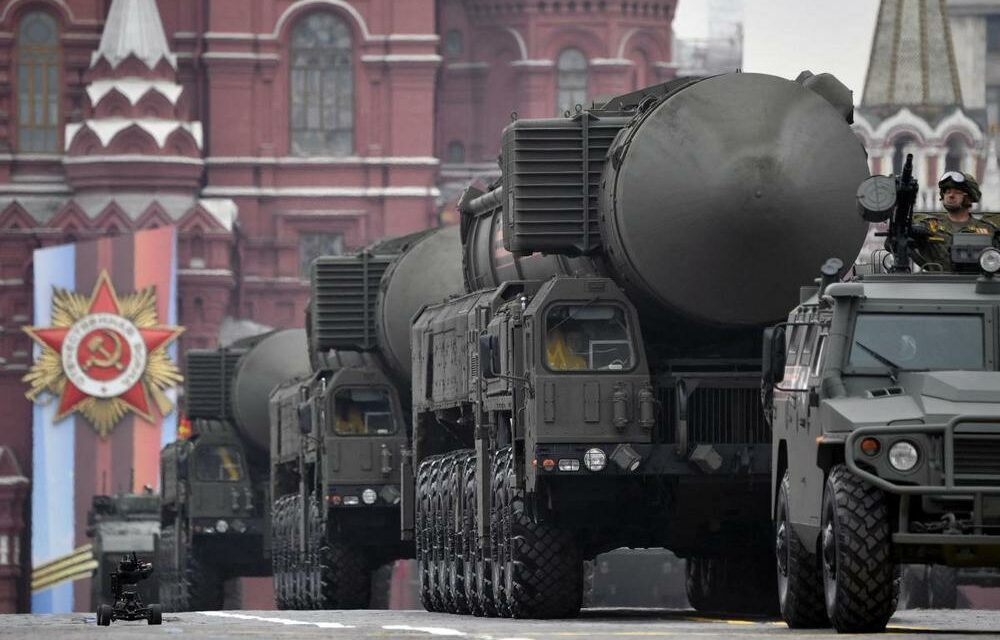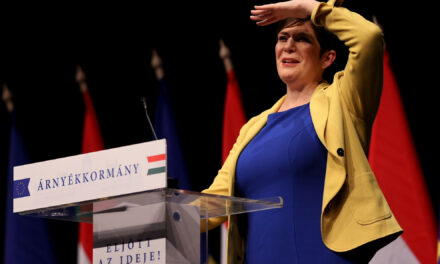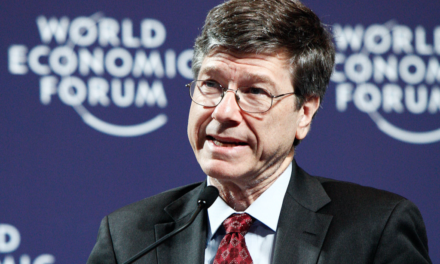What does it take for the Russians to use tactical nuclear weapons, how would NATO retaliate, and what awaits Hungary if the situation escalates in this way? Here are the scripts!
It is to be remembered that the other day people were upset by the fact that the British will deliver anti-tank projectiles containing depleted uranium to Ukraine, and the Russian president promised serious countermeasures, thus raising the stakes to a new level, at least verbally.
And recently, Poland's ambassador in Paris made a very ominous comment on a TV show that "If Ukraine gets into a difficult situation, its losses increase, and a situation arises where Ukraine can no longer defend itself and its independence, then we will have no other choice." , as entering the war as a participant”.
However, before we panic for good,
it is worth considering how an escalation would look in reality
– and it wouldn't necessarily start with mushroom clouds rising into the air and the Earth being destroyed, but there are plenty of very unpleasant and catastrophic possibilities in the deck.
Bálinto Somkuti, a researcher at the Geopolitics Workshop of the MCC, stated: nuclear weapons, together with biological or chemical weapons, belong to the range of weapons of mass destruction, the use of which is a clear taboo.
That's why,
if someone deploys either of them, there is a chance that someone else will respond with the same or even harsher means.
That is why, according to the security policy expert, it is very fortunate that although there have been reports that the Ukrainians or the Russians are using chemical weapons, "so far, thank God, this has not been confirmed." On the other hand, if a state that has them finds itself in a bad situation militarily, it will deploy this type of device - however, both military logic and common sense dictate that only as a last resort".
At the same time, it was precisely for this reason that the annexation of the four territories separated from Ukraine by referendum was significant, because from then on, according to Moscow's logic, they are considered Russian territory,
and the Russian military doctrine allows the use of nuclear weapons in their defense,
while, for example, in the Syrian mission, they would certainly not deploy such a thing, no matter what happens. However, if, say, a serious Ukrainian attack hits the outskirts of Belgorod, which is already in the crosshairs, I think they can respond with nuclear weapons.
The Crimean peninsula is an even more critical point: it is an essential element of Russia's presence in the Black Sea, for which they have fought a lot, and if this were to be threatened, according to Somkuti, it is almost certain that they would respond with a military nuclear warhead. This would stop the Ukrainians: it could be a strike on a crossing point, a control point, a weapons depot, or troops, which would make it almost impossible to advance further along this section with the radiation.
Ukraine would not be able to react to this on its own, since it no longer has its own weapons of mass destruction,
so NATO would have to respond to the move at some level.
"That's why the type of decision-making based on emotions, beliefs and passions, instead of interests, which is starting to dominate Westerners is dangerous". After all, NATO's western leadership, political leaders, should give instructions to the soldiers, who would normally act as a brake, knowing the risks, but the agitated public would demand a response. The West quickly threw out the more moderate means, the sanctions can no longer be increased, for example in the field of energy, or there is even the ICC arrest warrant issued for Putin.As the expert believes, "the problem is that the West is pushing itself into steps that on the one hand provoke their own public opinion, and on the other hand strengthen Putin's narrative, because he can sell it very well at home and in the third world, that the West just wants to discredit him five."
But what can NATO do in this situation?
Somkuti reminds us: theoretically, all decisions in NATO are made by consensus, and that is why, according to him
it is a very serious precedent that the NATO-Ukraine Council was convened against Hungary's will,
the principle of consensus has thus been damaged and will probably continue to erode.
In such cases, they can convene NATO's defense council with the defense ministers of the members, who will decide on the response measures, say, vote for some additional aid or additional tools for Ukraine, or decide on a more serious response within their own competence.
The question arises again, where?
If, say, a Russian military unit stationed on the Crimean Peninsula were to be attacked by NATO, that would be a clear declaration of war,
even if it's probably not a nuclear strike, but say a simple airstrike - with heavy losses, because Russian air defenses are at least as good as Ukrainian ones. To which the Russians would respond with a nuke because of the balance of power, for example, the – presumably Romanian or Polish – base would be hit. This is an open aggression on NATO territory, to which NATO must respond. Whether it's nuclear or not, the Russians' next response could already hit civilian targets.
"This is what I call the escalation slope, because once we start on it, it is very difficult to stop," explains Somkuti. This could even start as a result of an escalation-strengthening arms shipment from the Russian side; this is also conceivable on a smaller scale, for example, NATO training centers in the territory of Ukraine, which have been deliberately spared so far, could be hit. After that, the NATO leaders would also be more motivated to launch a harsher counterattack, and we are back at the same place.
How does this affect Hungary?
According to the expert, our country is becoming even more isolated from the zero minute: "both NATO and the EU are looking through us, as we saw in connection with the 2015 migrant crisis, as they put the brakes on all cooperation". At the same time, he points out, from a nuclear weapon point of view, so from an environmental point of view
a warhead deployed on the Crimean peninsula would not affect us directly, its effect would be local.
NATO would probably use our airspace violently, without consent, which would not be directed against us, but our sovereignty would be thoroughly violated. Also, we could already feel a tactical 200-400 kiloton atom hitting a Polish or Romanian base due to the smaller distance. We would see roughly Chernobyl-like effects: nuclear-contaminated dust gets into the air, which could reach this far, iodine would have to be taken and it would not be advisable to go out into the air.
"In a completely open world war, it is unlikely that Hungary would be a target", but the environmental burden there is much more brutal:
So, after such a nuclear war, the remaining radiation, the fire that occurs, the complete destruction of the infrastructure, this is a scenario that is not even worth thinking about.a megaton nuclear charge can completely destroy a city the size of Budapest.
According to the expert, the question is whether the Romanians would go along with launching such an attack, which would also be a serious blow to them, "but I think the Poles would." By the way, the Romanians have already been added to the Russian death list by purchasing the unreasonably long-range Patriot systems, while the Americans have developed the Kogălniceanu base near the Black Sea into a very serious center, and Somkuti believes that there is also a suspicion that the Americans brought here from Turkey the their nuclear arsenal.
"Chess is the national sport of the Russians: they would probably use such a situation very carefully to their advantage, and even a pre-emptive strike is not unthinkable", even with conventional warheads after a direct and proven NATO intervention.
In such a situation, the Romanians can be overrun by the Americans operating the base in the same way as they are over us
- because what the Romanian military leadership is doing, it cannot forcefully prevent its own allies from taking off NATO planes, it would be useless to explain to the Russians after all this - the expert describes the impossible situation.
According to Bálint Somkuti
the main problem is that the political will supersedes all the rules, regulations and customs that previously prevented a gross escalation.
A prime example of this is ignoring the Hungarian veto. In the meantime, the compulsion to comply overrides many things here in our region as well: "We know the emotional foundations of the Poles, but there are the Czechs, who demonstratively elected NATO General Petr Pavel as president, who is clearly a pro-Western figure to the point of self-destruction, and the Slovaks scatter their hitherto fearfully guarded equipment and skills to help the Ukrainians like there is no tomorrow".
The Romanians are also taking risks, for them the unification with the Moldovans may float in front of their eyes, and if the Russians let go of Transnistria - which according to Somkuti they will not, since they have brought a serious arsenal of weapons there - it would be a great Romanian victory. But, he adds, if the Russians insist on that, "then there will be very big problems."
Featured image: Intercontinental ballistic missiles on Red Square in Moscow in May 2019. AFP / Europress / ALEXANDER NEMENOV













